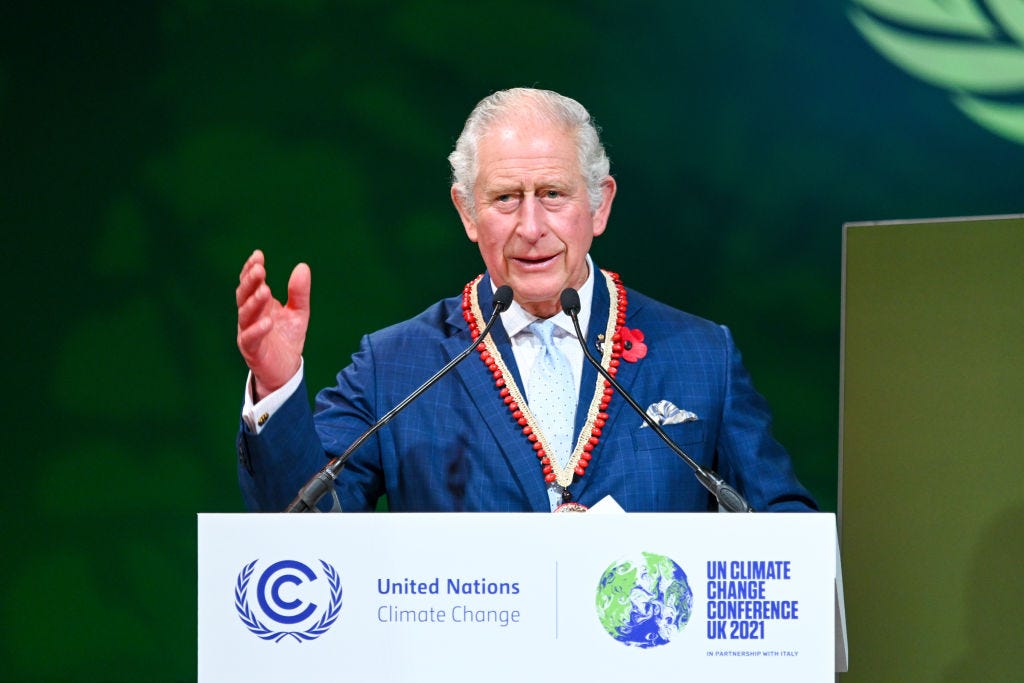HEATED - Stop calling Charles the "climate king"
Welcome back to HEATED, a newsletter for people who are pissed off about the climate crisis—written by me, Emily Atkin. IN TODAY’S ISSUE…
As per usual, paid subscriptions are paused while I re-gain my footing and decide on a set schedule for the newsletter. I do have an announcement, though: Paid subscriptions will return in October. But more on that later. Stop calling Charles the "climate king"The new British monarch has not earned such a title, say climate activists from colonized nations
In the wake of Queen Elizabeth II’s death, a new British monarch has risen: King Charles III, the so-called “climate king.” “The world has a climate king,” Politico’s E&E News declared on Friday in an article outlining Charles’s environmental bona fides. Vox called Charles the “climate change king” in a worth-reading piece analyzing how the new monarch might rule. VOA called Charles "the green king" in a similar article, as did… Women’s Wear Daily, for some reason. And in an interview with The Guardian, British environmentalist Tony Jupiter called Charles III "possibly the most significant environmental figure of all time." These articles of praise, however, are missing something: the opinions of climate activists from nations colonized by the British, which happen to be the nations most harmed by climate change. (Of the 10 most climate-vulnerable nations, eight are former British colonies, according to the Global Climate Risk Index). So in today’s issue, we’ll hear from climate justice advocates with ancestral ties to current and former British colonies on whether King Charles should be considered a “climate king”—and whether it’s possible for a “climate king” to exist at all. We’ll also discuss the inseparable link between British colonialism and climate change, and the tragic irony of Charles’ ascension coinciding with climate devastation in Pakistan, a former British colony. Let’s make one thing clear from the beginning: No one is denying Charles’s concern for the climate. The former Prince of Wales has been outspoken about biodiversity loss and global warming for decades. (Check out this Washington Post piece for a run-down of his resume). Charles’ advocacy has also included raising awareness in vulnerable British colonies in the Caribbean, a feat for which Tamara Toles O'Laughlin, president of the Environmental Grantmakers Association, gives him props. “[Charles] has successfully made issues of conservation, adaptation and mitigation in the U.K. and it’s colonialist territories a focal point,” she said. “This includes investing his time, his ceremonial power and convening capacity to draw attention to environment.” But Charles has never acknowledged the monarchy’s full responsibility for the climate crisis. Asked by the BBC last year if the U.K. was doing enough to combat climate change, he replied: "I couldn't possibly comment." And while Charles has acknowledged the general injustice of the monarchy’s colonial legacy, he has not connected that legacy to growing climate injustice around the world. Climate justice activists from colonized nations say this connection is important, because the very institution that gives Charles a powerful platform to speak on climate change is responsible for creating global crisis conditions in the first place. To truly be considered a “climate king,” they say, Charles would have to not only acknowledge the climate harm done by the monarchy, but take steps to repair it. “Most of the environmental initiatives of King Charles are small symbolic actions and pretty words, nowhere near the scale of struggle and sacrifice that the world needs at the present moment to save us from ecological catastrophe,” said Basav Sen, climate policy project director at the Institute for Policy Studies. “Regardless of what King Charles may have done for the environment in his personal capacity, he is an inheritor of the legacy of the British monarchy and the British empire.” And if he doesn’t reckon with that legacy, at the very least, we should. The inseparability of colonization and climate crisisThe British monarchy’s climate legacy goes far beyond its own historical carbon emissions, explains Sen, who was born and raised in India and whose parents are from Bangladesh:
In other words, the only reason the monarchy had the money to kick off the Industrial Revolution was because it took that money from other countries through colonization. And while that revolution continued, and carbon started pouring into the atmosphere, the monarchy grew its wealth, while the countries it colonized were left destabilized. The destabilization from colonization is a big reason why today, so many current and former British colonies do not have the resources for mitigating, adapting to, or recovering from the effects of climate change, advocates say. The present-day apocalyptic flooding in Pakistan is a prime example, said Keya Chatterjee, executive director of U.S. Climate Action Network:
Colonization, Sen said, is “also why many of these counties have to borrow from institutions like the International Monetary Fund and World Bank, and get stuck on a treadmill of debt.” Pakistan’s debt currently exceeds $250 billion. Of course, there are multiple reasons for destabilization and poverty in any country, and Chatterjee was quick to acknowledge that British colonization cannot be completely blamed for Pakistan’s vulnerability. But colonization “is an obvious piece that's well-documented,” she said. Indeed, the Intergovernmental Panel on Climate Change has explicitly named colonialism as a past and present driver of climate injustice. In its last report, the international consortium of the world’s top climate scientists said that high vulnerability is driven by “historical and ongoing patterns of inequity such as colonialism, especially for many Indigenous Peoples and local communities.” In addition, research published in the journal PNAS in 2020 found that colonization “disrupted livelihoods, reshaped land- and seascapes, threatened intergenerational ecological knowledge transfer, and led to increased inequality and climate vulnerability” on islands in the Caribbean and southwestern Indian Ocean. Parading stolen wealth while Pakistan drownsWhile British colonization has left a legacy of massive climate vulnerability for nations like Pakistan, it has left the U.K.—and Charles—a legacy of massive wealth with which to protect itself. Forbes estimates the royal family holds $28 billion in assets, although no one truly knows how much they have. Much of that wealth has been on full display this month, as the world’s attention has been fixed on the monarchy. This doesn’t sit right with Sen. “While Pakistan is drowning, much of the world media is fixated on the new monarch of its former colonizer instead,” he said. “This is historical amnesia, and fails to make the connections between colonialism, poverty, and climate change.” Pakistan has racked up $30 billion in damages from this year’s flooding, prompting UN Secretary-General Antonio Guterres to call for “massive financial support” from the international community. The U.K. responded to that call with $1.7 million in aid. To Chatterjee, whose parents were displaced by the partition of India, these displays of wealth paired with the paltry aid feel like a slap in the face. “So much of Britain’s wealth was built stealing stuff from the Indian subcontinent, and now that stolen stuff is on display on TV every day, just as Pakistan is one third under water,” she said. “When I see that, I think, ‘They need to give that stuff back.” Indeed, “giving stuff back” is essentially what climate activists from colonized nations say is necessary if Charles truly wants to be considered a “climate king.” “The most dramatic and impactful action he could take now would be to call for forgiveness of colonies debt, declare rights of managed retreat for former colonies fleeing the climate crisis into the U.K. without means testing or diplomatic isolation, and dissolution of territorial subjugation and the empire—you know, climate reparations,” Toles O’Laughlin said. “Or else it’s all an illusion.” Chatterjee also said Charles must support a U.N. agreement for loss and damages—that is, a process for establishing responsibility and compensation for the unavoidable, irreversible harm that rich, high-polluting countries have caused poor, low-polluting ones. “If he truly understood what is required for us to survive in the climate crisis, he would take all the resources at his disposal and use them to take care of people,” she said. “All the resources have to be shared for us to survive this mess that we made.” The laughable idea of a “climate king”It’s exceedingly unlikely that King Charles would ever take the steps climate justice activists deem necessary to be considered a “climate king.” Comb through his speeches on what must be done to solve climate change, and you’ll see an obsession with harnessing markets and capital. You’ll see little on the subject of accountability—and even less on the subject of repairing harm done by the British Empire. There’s also the fact that the King is traditionally a non-political figure. The main purpose of his position is to defend and uphold the monarchy. He’s now expected to bite his tongue far more than he did as Prince. If he were ever going to criticize the monarchy—and, on top of that, call for its partial dissolution—the time has probably passed. But the biggest indicator that Charles will never earn the title of “climate king” is the nature of monarchy itself. The fact is, kings are not in the business of giving power back to the people they rule over. The business of kings amounts to hoarding power; to hoarding wealth; and to believing that you know what is best for the poor. Monarchy itself is antithetical to climate justice, which calls for giving power back to the people most harmed by the climate crisis. Anthony Rogers-Wright, a Sierra Leonean and environmental justice director at New York Lawyers for the Public Interest, puts it this way:
FURTHER READING:
LOOKING FOR A NEW PODCAST? Look no further. A Matter of Degrees is a show for climate-curious folks, hosted by two friends-of-the-newsletter: Dr. Leah Stokes and Dr. Katharine Wilkinson. The podcast tells stories about the powerful forces behind climate change and the tools we have to fix it. Episodes include an explainer on how gender equality can save the planet, a look at the “Darth Vader” of electric utilities, and a deep-dive on the devious plan to keep us hooked on fossil gas. Season 3 is coming out Sept. 15. Get it wherever you get your podcasts. CATCH OF THE DAY: Fish was informed that the photo of his friend Pepper, the cheerful cherub of reader Clarke, did not show up in the newsletter a few weeks ago. This is a tragedy, so today Fish will repair it by showing *two* photos of Pepper. First, the one that did not load:
Want to see your furry (or non-furry!) friend in HEATED? Send a picture and some words to catchoftheday@heated.world. |
Older messages
AOC is HEATED
Sunday, October 9, 2022
Just a little note on something cool that happened.
This is what fossil fuel extremism looks like
Sunday, October 9, 2022
For the GOP, fossil fuels are a religion, and pointing out that they hurt people is blasphemy.
Ro Khanna's quest to expose Big Oil
Sunday, October 9, 2022
The Congressman leading the House Oversight investigation into Big Oil reflects on this past year's triumphs and struggles.
Listen to our interview with Rep. Ro Khanna
Sunday, October 9, 2022
The Congressman leading the House Oversight investigation into Big Oil reflects on this past year's triumphs and struggles.
The climate idiocy of Ron DeSantis
Sunday, October 9, 2022
Florida's governor is spending $1 billion to shield his constituents from a crisis he's actively trying to make worse.
You Might Also Like
Starting Thursday: Rediscover Inspiration Through Wordsworth
Sunday, March 9, 2025
Last chance to register for our next literary seminar starting March 13. March Literary Seminar: Timothy Donnelly on William Wordsworth Rediscover one of the most influential poets of all time with
5 little treats for these strange and uncertain times
Sunday, March 9, 2025
Little treat culture? In this economy?
RI#266 - Down the rabbit hole/ What is "feels-like" temp/ Realtime voice tutor
Sunday, March 9, 2025
Hello again! My name is Alex and every week I share with you the 5 most useful links for self-improvement and productivity that I have found on the web. ---------------------------------------- You are
Chaos Theory: How Trump is Destroying the Economy
Sunday, March 9, 2025
Trump's erratic, chaotic governing style is dragging down the economy ͏ ͏ ͏ ͏ ͏ ͏ ͏ ͏ ͏ ͏ ͏ ͏ ͏ ͏ ͏ ͏ ͏ ͏ ͏ ͏ ͏ ͏ ͏ ͏ ͏ ͏ ͏ ͏ ͏ ͏ ͏ ͏ ͏ ͏ ͏ ͏ ͏ ͏ ͏ ͏ ͏ ͏ ͏ ͏ ͏ ͏ ͏ ͏ ͏ ͏ ͏ ͏ ͏ ͏ ͏ ͏ ͏ ͏ ͏ ͏ ͏ ͏ ͏ ͏
Chicken Shed Chronicles.
Sunday, March 9, 2025
Inspiration For You. ͏ ͏ ͏ ͏ ͏ ͏ ͏ ͏ ͏ ͏ ͏ ͏ ͏ ͏ ͏ ͏ ͏ ͏ ͏ ͏ ͏ ͏ ͏ ͏ ͏ ͏ ͏ ͏ ͏ ͏ ͏ ͏ ͏ ͏ ͏ ͏ ͏ ͏ ͏ ͏ ͏ ͏ ͏ ͏ ͏ ͏ ͏ ͏ ͏ ͏ ͏ ͏ ͏ ͏ ͏ ͏ ͏ ͏ ͏ ͏ ͏ ͏ ͏ ͏ ͏ ͏ ͏ ͏ ͏ ͏ ͏ ͏ ͏ ͏ ͏ ͏ ͏ ͏ ͏ ͏ ͏ ͏ ͏ ͏ ͏ ͏ ͏ ͏ ͏ ͏
“Hymn of Nature” by Felicia Dorothea Hemans
Sunday, March 9, 2025
O! Blest art thou whose steps may rove ͏ ͏ ͏ ͏ ͏ ͏ ͏ ͏ ͏ ͏ ͏ ͏ ͏ ͏ ͏ ͏ ͏ ͏ ͏ ͏ ͏ ͏ ͏ ͏ ͏ ͏ ͏ ͏ ͏ ͏ ͏ ͏ ͏ ͏ ͏ ͏ ͏ ͏ ͏ ͏ ͏
Claim Your Special Men's Health Offer Today!
Sunday, March 9, 2025
Subscribe to Men's Health today! Men's Health logo Get stronger, smarter, better 1 year of print mag + digital mag access Men's Health Magazine is the essential read for active, successful,
The 2025 Color Trends You *Should* Be Wearing Right Now
Sunday, March 9, 2025
They pack a playful punch. The Zoe Report Daily The Zoe Report 3.8.2025 The 2025 Color Trends You *Should* Be Wearing Right Now (Trends) The 2025 Color Trends You *Should* Be Wearing Right Now They
6 Most Common Tax Myths, Debunked
Saturday, March 8, 2025
How to Finally Stick With a Fitness Habit. Avoid costly mistakes in the days and weeks leading up to April 15. Not displaying correctly? View this newsletter online. TODAY'S FEATURED STORY Six of
Weekend: My Partner Can’t Stand My Good Friend 😳
Saturday, March 8, 2025
— Check out what we Skimm'd for you today March 8, 2025 Subscribe Read in browser Header Image But first: this is your sign to throw away your old bras Update location or View forecast EDITOR'S





